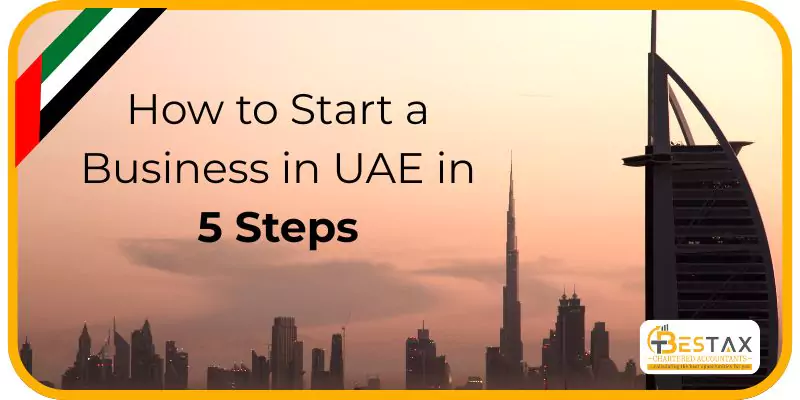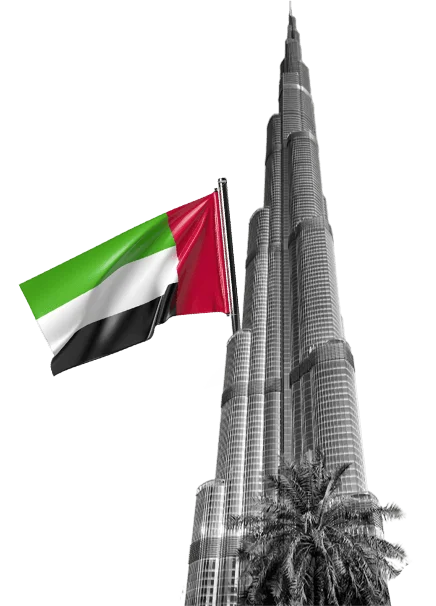The UAE’s economy is on a strong growth trajectory. According to the International Monetary Fund (IMF), the country’s GDP is projected to grow by 4% in 2025. Dubai’s economy is expected to expand by 3.3% in the same year. This growth is driven by sectors like tourism, trade, and finance.
Sharjah is also experiencing economic development. The Sharjah Economic Development Department (SEDD) reported a 96% increase in business licenses issued in 2023. This indicates a thriving business environment in the emirate.
In a Hurry? Here Are 5 Simple Steps to Start Your Business
- Choose your business activity
- Select your legal structure
- Register your trade name
- Get initial approval
- Apply for your business license
How to Start a Business in the UAE in 5 Steps

1: Choose Your Business Activity
Begin by identifying the nature of your business. The UAE offers over 2,000 economic activities across various sectors. Your chosen activity will determine the type of license you need. For instance, if you’re planning to open a restaurant, you’ll require a commercial license.
In Dubai, the Department of Economic Development (DED) provides a comprehensive list of permitted activities. Similarly, in Sharjah, the SEDD offers guidance on business activities.
2: Decide on the Legal Structure
Your business’s legal structure affects ownership, liability, and operations. Common structures include:
- Sole Proprietorship: Owned by one individual.
- Limited Liability Company (LLC): Suitable for multiple shareholders.
- Branch of a Foreign Company: Allows foreign companies to operate in the UAE.
3: Register Your Trade Name
Your business name is more than just branding, it’s part of your legal identity in the UAE. The trade name must:
- Reflect your business activity
- Include the legal structure (e.g., LLC)
- Be unique (not already registered)
- Avoid religious, offensive, or governmental terms
Trade name registration can be done online through the Department of Economic Development (DED) in Dubai or the Sharjah Economic Development Department (SEDD).
4: Obtain Initial Approval
The next step is to apply for initial approval. This certificate means the government has no objection to your business setup. However, it is not a license to start operations.
Foreign investors may need extra approval from the General Directorate of Residency and Foreigners Affairs (GDRFA). Some business types (like legal or health services) require pre-approval from related authorities before you submit this application.
For companies like LLCs or joint stock companies, you will also need to prepare a Memorandum of Association (MOA). This document outlines your company’s ownership, responsibilities, and profit-sharing. It must be notarized.
Other Important Considerations
Government Approvals: Depending on your activity, you may need extra clearance. For example:
- Ministry of Interior: Transportation, car rentals
- Health Authority: Clinics, pharmacies
- Ministry of Justice: Legal services
- Tourism Department: Travel and tourism companies
Register with the Chamber of Commerce: Before you start operations, register with the local Chamber of Commerce. This includes:
- Dubai Chamber
- Sharjah Chamber
- Other emirate-specific chambers
5: Finalize Legal Documents and Secure a Business License
Depending on your chosen legal structure, you’ll need to prepare specific documents:
- Memorandum of Association (MOA): Outlines the company’s operational framework.
- Local Service Agent Agreement: Required for certain business types.
Once your documents are in order, submit them along with your license application. The type of license, commercial, industrial, or professional, depends on your business activity.
In Dubai, the Department of Economic Development (DED) handles license issuance. In Sharjah, the SEDD is responsible.
Additional Considerations
You can start a business either on the mainland or in a free zone. Here’s the difference:
Free Zone
- 100% foreign ownership
- No customs duties on imports/exports within the zone
- Quick and low-cost business setup
- Limited to doing business inside the free zone or internationally (unless you work with a local distributor)
Mainland
- Can trade anywhere in the UAE and globally
- May need a local sponsor (depending on activity)
- More flexibility in choosing office locations
Some well-known free zones include Shams Free Zone, SPC Free Zone, and SAIF Zone in Sharjah, and DMCC, DIFC, and Dubai Silicon Oasis in Dubai.
How to Start a Business Online in the UAE
If you prefer speed and convenience, you can use Basher, a government platform that lets you set up your company in under 15 minutes. This online service connects to both federal and local authorities. You don’t have to visit any offices.
Basher is ideal for small businesses, consultants, or digital freelancers looking to register fast and start working.
Visit the Ministry of Economy to access this platform.
Costs Involved
The cost of starting a business varies based on several factors:
- License Type: Different licenses have varying fees.
- Location: Setting up in a free zone may offer cost-effective packages.
- Business Activity: Some activities require additional approvals, impacting the overall cost.
Utilize tools like the Shams cost calculator to estimate your expenses.
Visa Processing and Bank Account Setup
After obtaining your license, you can apply for visas for yourself and your employees. Additionally, opening a corporate bank account is essential for business transactions. Each bank has its requirements, so it’s advisable to consult with them directly.
Should You Hire Business Setup Consultants?
The process can be simple, but small errors may cause delays. Many entrepreneurs hire business setup consultants in Dubai, like Bestax, to help with:
- Paperwork
- Approvals
- Trade name registration
- Visa and bank account setup
- Choosing between Free Zone and Mainland options
Consultants like at Bestax can save you time and money by handling the process efficiently.
Final Thoughts
Starting a business in Dubai or Sharjah is one of the smartest moves you can make in today’s growing market. The UAE offers a secure, modern, and globally connected environment for entrepreneurs.
Whether you go through the full traditional process or set up online in 15 minutes, the UAE makes it easy to begin. From LLC formation, DED licensing, to free zone registration, everything is built to support growth.
Quick FAQs: Starting a Business in Dubai and Sharjah
1. How do I start a business in Dubai as a foreign investor?
To start a business in Dubai, choose your business activity, decide on a legal structure (like an LLC), register your trade name, get initial approval from the DED, and apply for a business license. You can also explore free zones for 100% foreign ownership.
2. What are the steps to start a business in Sharjah?
The steps to start a business in Sharjah include selecting a business activity, choosing a legal form, registering a trade name, getting initial approval, and applying for a license through the Sharjah Economic Development Department (SEDD) or a free zone like Shams.
3. What is the cost to start a business in Dubai or Sharjah?
The cost to start a business in Dubai or Sharjah depends on your license type, location, and legal structure. Free zone packages can start as low as AED 5,000, while mainland setups may cost more due to office lease and visa charges.
4. How to register a company in the Sharjah Free Zone?
To register a company in Sharjah, especially in a free zone like Shams or SAIF Zone, choose your license type, submit your documents online, and get approval. Free zones often offer faster, more affordable setup options with no local sponsor required.
5. Do I need business setup consultants in Dubai or Sharjah?
While it’s possible to handle your business setup in Dubai or Sharjah on your own, many entrepreneurs hire business setup consultants. They help with paperwork, approvals, and avoiding delays, especially if you’re new to UAE regulations.
Disclaimer: The information provided in this blog is for general informational purposes only. For professional assistance and advice, please contact experts.





